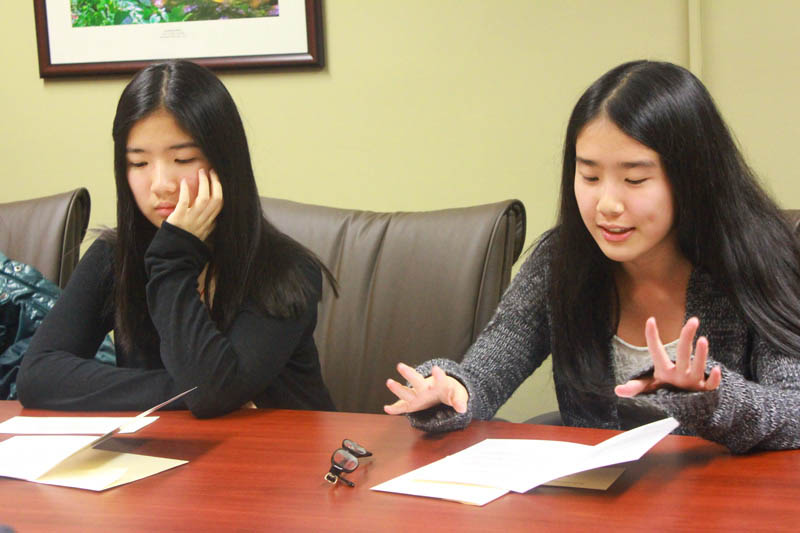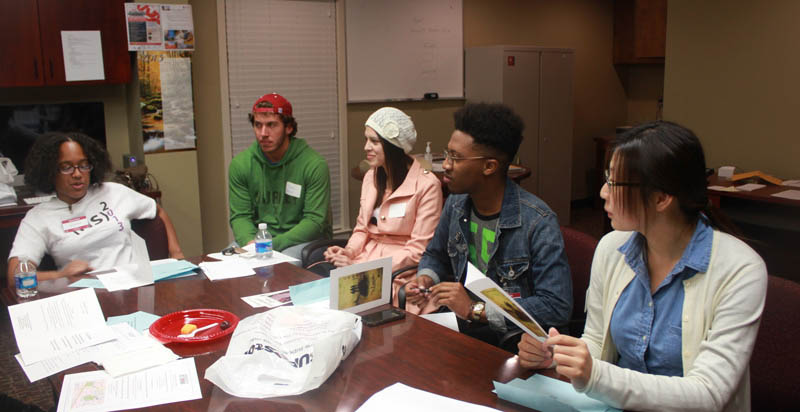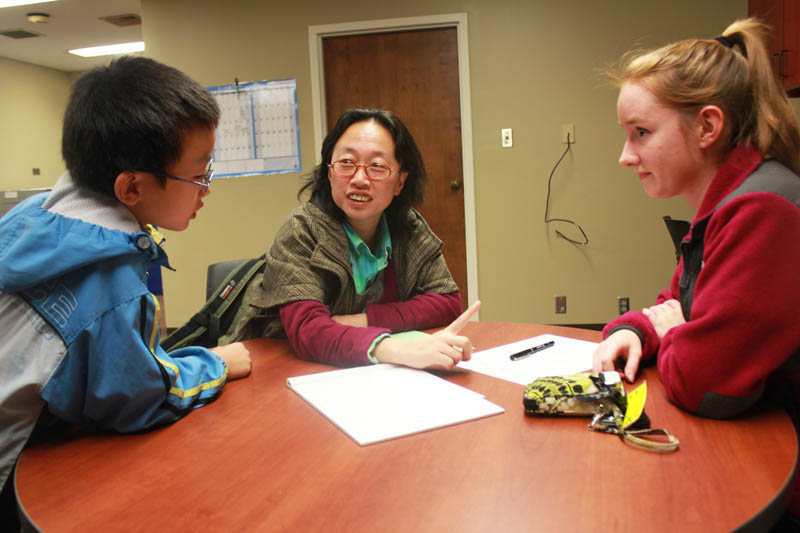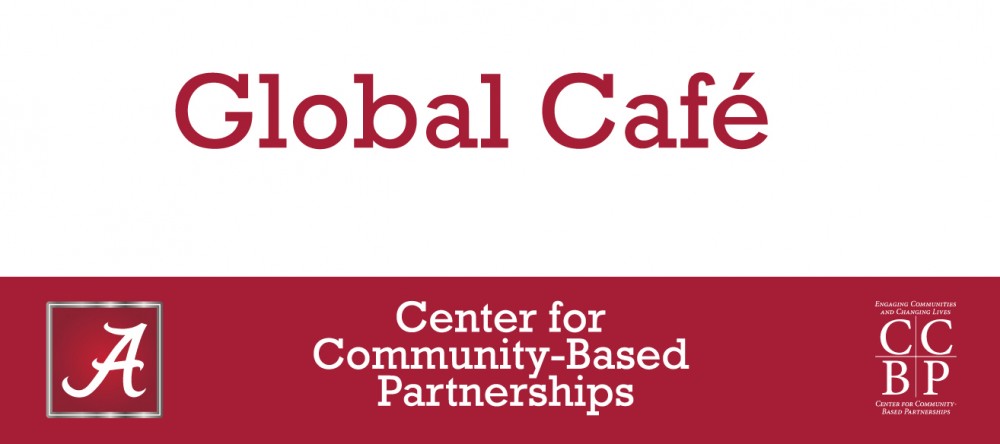African American History Month List of Events
- February 13th, 2014
- in Spotlight
By Sirui Shao and Kirsten J. Barnes
Staff Writers, Center for Community-Based Partnerships

In celebration of International Education Week (November 12–18), UA’s Center for Community-Based Partnerships hosted its first Global Café, showing an hour-long documentary called “The Dialogue,” which explores international interpersonal exchange. The film was created by Crossing Borders Films and co-produced by Michigan State University.
“International Education Week offered a chance for us all to pause and appreciate the learning opportunities offered by international study. That means U.S. students traveling abroad and international students coming here,” said Dr. Beverly Hawk, CCBP’s director of program services and campus advisor for the Fulbright Program. “International study offers us many opportunities to make friends from around the world.”
Global Café, in the Hillard Building, 900 Anna Avenue, opened at 6:30 p.m., November 14. About 30 students, faculty and community members attended. Among the attendees were a Chinese professor, international friends, students working with the Heart Touch pen-pal program, and CCBP staff and student leaders.
The film, “The Dialogue,” followed eight students – four American and four Chinese –as they traveled throughout China, experiencing its culture. Along the way, the students visited Hong Kong and Southwest China. The film captured their shared travel adventures, emotions of culture shock, honest confrontations, and discoveries.

After the film, the Global Café attendees were separated into three groups and asked to discuss the film.
Xia Ping Li, a UA student, said what struck her most about the movie was the diversity and the culture shock experienced by the eight students. “As an international student you experience things differently,” Li said.
Other attendees were impressed that the film discussed misconceptions about cultures and how they influence our relationships.
“Being a Muslim student here, when I talk to people sometimes I am the first Muslim student they have met,” said Hailah Saeed. “The film was very powerful because it made me realize that I make a difference. People have a lot of crazy ideas about Muslims, but just by interacting with me they understand more about what it means to be a Muslim.”
Danielle Noland, who served as her group’s leader, said she was interested in the communication issues that the film brought out.
“Somebody might say something in general, but someone from another culture may interpret it differently. Also, after seeing the film, I think interaction with international students makes us more accepting of one another,” Noland said. “After this experience, people may not be as hesitant to talk with people from other cultures.”
The groups discussed the film for about 20 minutes before reconvening together to share their responses.
“We can’t change the whole world, but it starts with your classmates in the university and through this you can create a global change,” Saeed said.
As the name suggests, Global Café provides the space for people to share traditions, learn languages together and make new friends. It welcomes people from across our community and around the world. As part of the Division of Community Affairs, the Global Café brings together student energy, community wisdom, and scholarly expertise to accomplish shared goals.
“I was inspired by the film and the conversations. It was really a powerful film. The students in the film shared their responses quite honestly and courageously. I think it set a good foundation for the conversations that followed,” Hawk said.

The topics for discussion brought forward students’ personal experiences and related them to the issues raised by the film, and students developed suggestions for building community on our campus.
Jin Wang, a mechanical engineering graduate student who participates in the Heart Touch program, said he was glad he attended.
“I think Global Café is a good activity for international communication. Together, we can watch an interesting movie concentrating on different cultures and have a small discussion to share ideas,” Wang said. “I can talk to different people from various countries and get to know more international culture.”
Wang said before coming to America, he did not know how much he would love football, but attending UA allowed him to embrace the sport that is so much a part of Alabama culture.
After the student discussion groups came back together, they were asked to write a sentence describing what they learned that evening. The sentences were posted on the wall to share, and they said things such as: “I have learned the importance of communicating diversity.”
“The participants enjoyed that chance to meet new people and share experiences, and next time we will expand the conversation time.” Hawk said, “Together with our campus and community partners, we will host more Global Café programs in spring semester.”

By Sirui Shao
CCBP Editorial Assistant
“The Dialogue,” an hour-long documentary championing international culture, will be shown at 6:30 p.m. Thursday, Nov. 14, at the Global Café, an initiative of the Center for Community-Based Partnerhip (CCBP), 900 Anna Ave., directly behind the Arby’s on University Boulevard.
As the number of international students increases on the UA campus, organizations are expanding their cultural activities. With 5 percent of its population coming from 90 foreign countries, the CCBP is responding to the needs of native and international students by creating Global Café, a venue for bringing about greater international cultural communication, understanding and exploration.
This year during International Education Week, November 12–18, UA will host several events related to other cultures. They include a Mango Languages (Central Sudan) Demonstration; an Apwonjo (meaning “I teach” in Luo [Uganda] Bake Sale for Kiva (an organization that makes low-income loans to underserved entrepreneurs); and African Display (display on different African tribal concepts of beauty compared to Western notions of beauty), a World Soccer Tournament, with teams representing countries from around the world; and the film at Global Café.
Partners for the program include the Capstone International Center, Heart Touch (a pen-pal project for U.S. and Chinese elementary school students), and the Student Enrichment Experience Team (a CCBP program that connects undergraduate and graduate students, from all disciplines, to the work of community engaged scholarship).
“International Education Week is a chance for us all to pause and appreciate the learning opportunities offered by international study. That means U.S. students traveling abroad and international students coming here,” said Dr. Beverly Hawk, CCBP’s director of program services and the advisor for the Fulbright Program. “International study offers us many opportunities to makes friends from around the world.”
As the name suggests, Global Café provides the space for people to share traditions, learn languages together and make new friends.
A highlight of this year’s event is the screening of a documentary entitled “The Dialogue,” which follows eight students as they travel to China.
This year Capstone International selected Chinese culture and “The Dialogue” as an example of Chinese students sharing their culture with American students. The film was created by Crossing Borders Films and co-produced by Michigan State University. It follows four American and four Chinese university students as they travel together through Hong Kong and Southwest China, capturing their shared travel adventures, emotions of culture shock, honest confrontations and discoveries.
These experiences become doorways that deepen their understanding of the world and themselves. “It is an interesting movie,” Hawk said. “Lots of students around the world have watched it, and we want our students to have an opportunity to experience it as well. If people are interested in other cultures, for example Japan, Ireland and Spain, Global Café will meet the demand.”
All are welcome to attend and there is no charge. Food and conversation will follow the film.